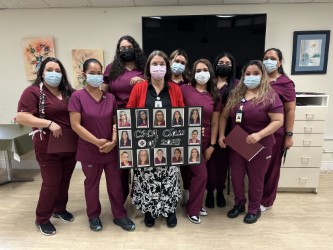Getting Help for PTSD
- Category: Health & Wellness, Behavioral Health
- Posted On:
- Written By: LVMC

PTSD is no longer considered an issue mainly for the military or first responders. The disorder affects all age groups, and a free app can help families manage PTSD impacts.
Posttraumatic Stress Disorder, know more commonly as PTSD, includes a host of symptoms that can have an effect on the family members of the person suffering. A person living with PTSD will find that their ability to function as a parent or partner may be impacted, according to the Veterans Administration’s National Center for PTSD. Changes in how a person gets through life can lead to serious problems within a family unit, and increased stress for everyone involved.
June marks PTSD Awareness Month, and it’s a good time to understand the lasting impacts of the disorder. For some people experiencing a traumatic event, the impacts may lessen over time. But for others, the stress reaction associated with a traumatic event may start to impact a person’s everyday life.
What are the symptoms?
According to the American Psychiatric Association, symptoms of PTSD fall into four categories. A person’s specific symptoms may vary in severity.
The symptoms are:
Intrusion: A person suffering from PTSD may have intrusive thoughts, such as repeated, involuntary memories. They may also have nightmares or flashbacks. Some people, according to the APA, may feel as if they are re-living the traumatizing experience.
Avoidance: This may mean avoiding places or people associated with the event, as well as objects or situations. Some people may avoid talking about what took place, or how they feel.
Cognition and Mood: Some people with PTSD may not be able to remember specific elements of the traumatic event. They may also have ongoing fear, guilt, anger, or shame. Some sufferers may feel detached and estranged or be unable to experience positive emotions.
Arousal and reactivity: Some PTSD symptoms may include irritability or angry outbursts. Some people with PTSD may act recklessly or in a self-destructive manner. PTSD may also cause someone to be easily startled or have trouble with concentration or sleeping.
Learning to Manage
The Department of Veterans Affairs has created a free mobile application called PTSD Coach (https://mobile.va.gov) to help people learn how to manage symptoms that may occur after a trauma. The app provides information about PTSD and treatments; tools for screening and tracking symptoms; ideas about ways to handle stress and links to support and help. PTSD Coach Online (ptsd.va.gov) is a desktop version that includes more than a dozen tools to help manage stress.
The VA also has an app to help the partners and loved ones of people with PTSD, with tools to help family members manage their well-being. Called PTSD Family Coach, users can access information about managing symptoms, self-care, and parenting. There is also information about exploring treatment options and tips about responding to anger.
It is important to note, however, that PTSD Coach and PTSD Family Coach are not intended to replace the professional care that may be needed or desired by a person suffering from PTSD or family and loved ones impacted by the disorder.
The Veterans Administration app also provides tools to manage stress levels and also tips on communicating effectively.
Options for Help
If you are in a crisis with PTSD, call 9-1-1 or go to the nearest emergency room. You can also contact the National Suicide Prevention Lifeline at 800-273-8255. The Veterans Crisis Line is available by texting 838255 or calling 800-273-8255 and pressing 1.
Help is also available through Lompoc Health counselors who offer one-on-one, couples, family, and group counseling services. The counselors are trained and experienced and offer treatment for Posttraumatic Stress Disorder, anxiety disorders, depressive disorders, stress reduction, and more. To make an appointment, call 805-875-8850.






